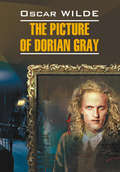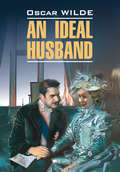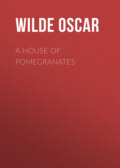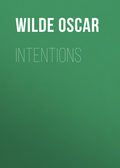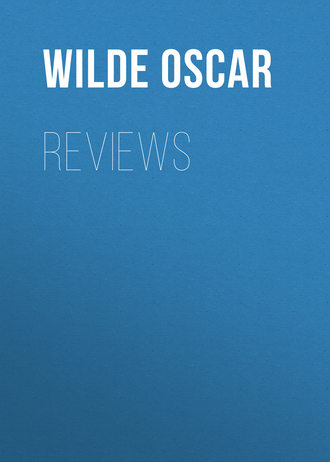
Оскар Уайльд
Reviews
SOME NOVELS
(Saturday Review, May 7, 1887.)
The only form of fiction in which real characters do not seem out of place is history. In novels they are detestable, and Miss Bayle’s Romance is entirely spoiled as a realistic presentation of life by the author’s attempt to introduce into her story a whole mob of modern celebrities and notorieties, including the Heir Apparent and Mr. Edmund Yates. The identity of the latter personage is delicately veiled under the pseudonym of ‘Mr. Atlas, editor of the World,’ but the former appears as ‘The Prince of Wales’ pur et simple, and is represented as spending his time yachting in the Channel and junketing at Homburg with a second-rate American family who, by the way, always address him as ‘Prince,’ and show in other respects an ignorance that even their ignorance cannot excuse. Indeed, His Royal Highness is no mere spectator of the story; he is one of the chief actors in it, and it is through his influence that the noisy Chicago belle, whose lack of romance gives the book its title, achieves her chief social success. As for the conversation with which the Prince is credited, it is of the most amazing kind. We find him on one page gravely discussing the depression of trade with Mr. Ezra P. Bayle, a shoddy American millionaire, who promptly replies, ‘Depression of fiddle-sticks, Prince’; in another passage he naïvely inquires of the same shrewd speculator whether the thunderstorms and prairie fires of the West are still ‘on so grand a scale’ as when he visited Illinois; and we are told in the second volume that, after contemplating the magnificent view from St. Ives he exclaimed with enthusiasm, ‘Surely Mr. Brett must have had a scene like this in his eye when he painted Britannia’s Realm? I never saw anything more beautiful.’ Even Her Majesty figures in this extraordinary story in spite of the excellent aphorism ne touchez pas à la reine; and when Miss Alma J. Bayle is married to the Duke of Windsor’s second son she receives from the hands of royalty not merely the customary Cashmere shawl of Court tradition, but also a copy of Diaries in the Highlands inscribed ‘To the Lady Plowden Eton, with the kindest wishes of Victoria R.I.’, a mistake that the Queen, of all persons in the world, is the least likely to have committed. Perhaps, however, we are treating Miss Bayle’s Romance too seriously. The book has really no claim to be regarded as a novel at all. It is simply a society paragraph expanded into three volumes and, like most paragraphs of the kind, is in the worst possible taste. We are not by any means surprised that the author, while making free with the names of others, has chosen to conceal his own name; for no reputation could possibly survive the production of such silly, stupid work; but we must say that we are surprised that this book has been brought out by the Publishers in Ordinary to Her Majesty the Queen. We do not know what the duties attaching to this office are, but we should not have thought that the issuing of vulgar stories about the Royal Family was one of them.
From Heather Hills is very pleasant reading indeed. It is healthy without being affected; and though Mrs. Perks gives us many descriptions of Scotch scenery we are glad to say that she has not adopted the common chromo-lithographic method of those popular North British novelists who have never yet fully realised the difference between colour and colours, and who imagine that by emptying a paint box over every page they can bring before us the magic of mist and mountain, the wonder of sea or glen. Mrs. Perks has a grace and delicacy of touch that is quite charming, and she can deal with nature without either botanising or being blatant, which nowadays is a somewhat rare accomplishment. The interest of the story centres on Margaret Dalrymple, a lovely Scotch girl who is brought to London by her aunt, takes every one by storm and falls in love with young Lord Erinwood, who is on the brink of proposing to her when he is dissuaded from doing so by a philosophic man of the world who thinks that a woodland Artemis is a bad wife for an English peer, and that no woman who has a habit of saying exactly what she means can possibly get on in smart society. The would-be philosopher is ultimately hoist with his own petard, as he falls in love himself with Margaret Dalrymple, and as for the weak young hero he is promptly snatched up, rather against his will, by a sort of Becky Sharp, who succeeds in becoming Lady Erinwood. However, a convenient railway accident, the deus ex machina of nineteenth-century novels, carries Miss Norma Novello off; and everybody is finally made happy, except, of course, the philosopher, who gets only a lesson where he wanted to get love. There is just one part of the novel to which we must take exception. The whole story of Alice Morgan is not merely needlessly painful, but it is of very little artistic value. A tragedy may be the basis of a story, but it should never be simply a casual episode. At least, if it is so, it entirely fails to produce any artistic effect. We hope, too, that in Mrs. Perks’s next novel she will not allow her hero to misquote English poetry. This is a privilege reserved for Mrs. Malaprop.
A constancy that lasts through three volumes is often rather tedious, so that we are glad to make the acquaintance of Miss Lilian Ufford, the heroine of Mrs. Houston’s A Heart on Fire. This young lady begins by being desperately in love with Mr. Frank Thorburn, a struggling schoolmaster, and ends by being desperately in love with Colonel Dallas, a rich country gentleman who spends most of his time and his money in preaching a crusade against beer. After she gets engaged to the Colonel she discovers that Mr. Thorburn is in reality Lord Netherby’s son and heir, and for the moment she seems to have a true woman’s regret at having given up a pretty title; but all ends well, and the story is brightly and pleasantly told. The Colonel is a middle-aged Romeo of the most impassioned character, and as it is his heart that is ‘on fire,’ he may serve as a psychological pendant to La Femme de Quarante Ans.
Mr. G. Manville Fenn’s A Bag of Diamonds belongs to the Drury Lane School of Fiction and is a sort of fireside melodrama for the family circle. It is evidently written to thrill Bayswater, and no doubt Bayswater will be thrilled. Indeed, there is a great deal that is exciting in the book, and the scene in which a kindly policeman assists two murderers to convey their unconscious victim into a four-wheeled cab, under the impression that they are a party of guests returning from a convivial supper in Bloomsbury, is quite excellent of its kind, and, on the whole, not too improbable, considering that shilling literature is always making demands on our credulity without ever appealing to our imagination.
The Great Hesper, by Mr. Frank Barrett, has at least the merit of introducing into fiction an entirely new character. The villain is Nyctalops, and, though we are not prepared to say that there is any necessary connection between Nyctalopy and crime, we are quite ready to accept Mr. Barrett’s picture of Jan Van Hoeck as an interesting example of the modern method of dealing with life. For, Pathology is rapidly becoming the basis of sensational literature, and in art, as in politics, there is a great future for monsters. What a Nyctalops is we leave Mr. Barrett to explain. His novel belongs to a class of book that many people might read once for curiosity but nobody could read a second time for pleasure.
A Day after the Fair is an account of a holiday tour through Scotland taken by two young barristers, one of whom rescues a pretty girl from drowning, falls in love with her, and is rewarded for his heroism by seeing her married to his friend. The idea of the book is not bad, but the treatment is very unsatisfactory, and combines the triviality of the tourist with the dulness of good intentions.
‘Mr. Winter’ is always amusing and audacious, though we cannot say that we entirely approve of the names he gives to his stories. Bootle’s Baby was a masterpiece, but Houp-la was a terrible title, and That Imp is not much better. The book, however, is undoubtedly clever, and the Imp in question is not a Nyctalops nor a specimen for a travelling museum, but a very pretty girl who, because an officer has kissed her without any serious matrimonial intentions, exerts all her fascinations to bring the unfortunate Lovelace to her feet and, having succeeded in doing so, promptly rejects him with a virtuous indignation that is as delightful as it is out of place. We must confess that we have a good deal of sympathy for ‘Driver’ Dallas, of the Royal Horse, who suffers fearful agonies at what he imagines is a heartless flirtation on the part of the lady of his dreams; but the story is told from the Imp’s point of view, and as such we must accept it. There is a very brilliant description of a battle in the Soudan, and the account of barrack life is, of course, admirable. So admirable indeed is it that we hope that ‘Mr. Winter’ will soon turn his attention to new topics and try to handle fresh subjects. It would be sad if such a clever and observant writer became merely the garrison hack of literature. We would also earnestly beg ‘Mr. Winter’ not to write foolish prefaces about unappreciative critics; for it is only mediocrities and old maids who consider it a grievance to be misunderstood.
(1) Miss Bayle’s Romance: A Story of To-Day. (Bentley and Son, Publishers in Ordinary to Her Majesty the Queen.)
(2) From Heather Hills. By Mrs. J. Hartley Perks. (Hurst and Blackett.)
(3) A Heart on Fire. By Mrs. Houston. (F. V. White and Co.)
(4) A Bag of Diamonds. By George Manville Fenn. (Ward and Downey.)
(5) The Great Hesper. By Frank Barrett. (Ward and Downey.)
(6) A Day after the Fair. By William Cairns. (Swan Sonnenschein and Co.)
(7) That Imp. By John Strange Winter, Author of Booties’ Baby, etc. (F. V. White and Co.)
THE POETS’ CORNER – III
(Pall Mall Gazette, May 30, 1887.)
Such a pseudonym for a poet as ‘Glenessa’ reminds us of the good old days of the Della Cruscans, but it would not be fair to attribute Glenessa’s poetry to any known school of literature, either past or present. Whatever qualities it possesses are entirely its own. Glenessa’s most ambitious work, and the one that gives the title to his book, is a poetic drama about the Garden of Eden. The subject is undoubtedly interesting, but the execution can hardly be said to be quite worthy of it. Devils, on account of their inherent wickedness, may be excused for singing —
Then we’ll rally – rally – rally —
Yes, we’ll rally – rally O! —
but such scenes as —
Enter ADAM.
ADAM (excitedly). Eve, where art thou?
EVE (surprised). Oh!
ADAM (in astonishment). Eve! my God, she’s there
Beside that fatal tree;
or —
Enter ADAM and EVE.
EVE (in astonishment). Well, is not this surprising?
ADAM (distracted). It is —
seem to belong rather to the sphere of comedy than to that of serious verse. Poor Glenessa! the gods have not made him poetical, and we hope he will abandon his wooing of the muse. He is fitted, not for better, but for other things.
Vortigern and Rowena is a cantata about the Britons and the Danes. There is a Druid priestess who sings of Cynthia and Endymion, and a chorus of jubilant Vikings. It is charmingly printed, and as a libretto for music quite above the average.
As truly religious people are resigned to everything, even to mediocre poetry, there is no reason at all why Madame Guyon’s verses should not be popular with a large section of the community. Their editor, Mr. Dyer, has reprinted the translations Cowper made for Mr. Bull, added some versions of his own and written a pleasing preface about this gentle seventeenth-century saint whose life was her best, indeed her only true poem.
Mr. Pierce has discovered a tenth muse and writes impassioned verses to the Goddess of Chess whom he apostrophises as ‘Sublime Caissa’! Zukertort and Steinitz are his heroes, and he is as melodious on mates as he is graceful on gambits. We are glad to say, however, that he has other subjects, and one of his poems beginning:
Cedar boxes deeply cut,
China bowls of quaint device,
Heap’d with rosy leaves and spice,
Violets in old volumes shut —
is very dainty and musical.
Mr. Clifford Harrison is well known as the most poetic of our reciters, but as a writer himself of poetry he is not so famous. Yet his little volume In Hours of Leisure contains some charming pieces, and many of the short fourteen-line poems are really pretty, though they are very defective in form. Indeed, of form Mr. Harrison is curiously careless. Such rhymes as ‘calm’ and ‘charm,’ ‘baize’ and ‘place,’ ‘jeu’ and ‘knew,’ are quite dreadful, while ‘operas’ and ‘stars,’ ‘Gaútama’ and ‘afar’ are too bad even for Steinway Hall. Those who have Keats’s genius may borrow Keats’s cockneyisms, but from minor poets we have a right to expect some regard to the ordinary technique of verse. However, if Mr. Harrison has not always form, at least he has always feeling. He has a wonderful command over all the egotistic emotions, is quite conscious of the artistic value of remorse, and displays a sincere sympathy with his own moments of sadness, playing upon his moods as a young lady plays upon the piano. Now and then we come across some delicate descriptive touches, such as
The cuckoo knew its latest day had come,
And told its name once more to all the hills,
and whenever Mr. Harrison writes about nature he is certainly pleasing and picturesque but, as a rule, he is over-anxious about himself and forgets that the personal expression of joy or sorrow is not poetry, though it may afford excellent material for a sentimental diary.
The daily increasing class of readers that likes unintelligible poetry should study Æonial. It is in many ways a really remarkable production. Very fantastic, very daring, crowded with strange metaphor and clouded by monstrous imagery, it has a sort of turbid splendour about it, and should the author some day add meaning to his music he may give us a true work of art. At present he hardly realises that an artist should be articulate.
Seymour’s Inheritance is a short novel in blank verse. On the whole, it is very harmless both in manner and matter, but we must protest against such lines as
And in the windows of his heart the blinds
Of happiness had been drawn down by Grief,
for a simile committing suicide is always a depressing spectacle. Some of the other poems are so simple and modest that we hope Mr. Ross will not carry out his threat of issuing a ‘more pretentious volume.’ Pretentious volumes of poetry are very common and very worthless.
Mr. Brodie’s Lyrics of the Sea are spirited and manly, and show a certain freedom of rhythmical movement, pleasant in days of wooden verse. He is at his best, however, in his sonnets. Their architecture is not always of the finest order but, here and there, one meets with lines that are graceful and felicitous.
Like silver swallows on a summer morn
Cutting the air with momentary wings,
is pretty, and on flowers Mr. Brodie writes quite charmingly. The only thoroughly bad piece in the book is The Workman’s Song. Nothing can be said in favour of
Is there a bit of blue, boys?
Is there a bit of blue?
In heaven’s leaden hue, boys?
’Tis hope’s eye peeping through.
for optimism of this kind is far more dispiriting than Schopenhauer or Hartmann at their worst, nor are there really any grounds for supposing that the British workman enjoys third-rate poetry.
(1) The Discovery and Other Poems. By Glenessa. (National Publishing Co.)
(2) Vortigern and Rowena: A Dramatic Cantata. By Edwin Ellis Griffin. (Hutchings and Crowsley.)
(3) The Poems of Madame de la Mothe Guyon. Edited and arranged by the Rev. A. Saunders Dyer, M.A. (Bryce and Son.)
(4) Stanzas and Sonnets. By J. Pierce, M.A. (Longmans, Green and Co.)
(5) In Hours of Leisure. By Clifford Harrison. (Kegan Paul.)
(6) Æonial. By the Author of The White Africans. (Elliot Stock.)
(7) Seymour’s Inheritance. By James Ross. (Arrowsmith.)
(8) Lyrics of the Sea. By E. H. Brodie. (Bell and Sons.)
MR. PATER’S IMAGINARY PORTRAITS
(Pall Mall Gazette, June 11, 1887.)
To convey ideas through the medium of images has always been the aim of those who are artists as well as thinkers in literature, and it is to a desire to give a sensuous environment to intellectual concepts that we owe Mr. Pater’s last volume. For these Imaginary or, as we should prefer to call them, Imaginative Portraits of his, form a series of philosophic studies in which the philosophy is tempered by personality, and the thought shown under varying conditions of mood and manner, the very permanence of each principle gaining something through the change and colour of the life through which it finds expression. The most fascinating of all these pictures is undoubtedly that of Sebastian Van Storck. The account of Watteau is perhaps a little too fanciful, and the description of him as one who was ‘always a seeker after something in the world, that is there in no satisfying measure, or not at all,’ seems to us more applicable to him who saw Mona Lisa sitting among the rocks than to the gay and debonair peintre des fêtes galantes. But Sebastian, the grave young Dutch philosopher, is charmingly drawn. From the first glimpse we get of him, skating over the water-meadows with his plume of squirrel’s tail and his fur muff, in all the modest pleasantness of boyhood, down to his strange death in the desolate house amid the sands of the Helder, we seem to see him, to know him, almost to hear the low music of his voice. He is a dreamer, as the common phrase goes, and yet he is poetical in this sense, that his theorems shape life for him, directly. Early in youth he is stirred by a fine saying of Spinoza, and sets himself to realise the ideal of an intellectual disinterestedness, separating himself more and more from the transient world of sensation, accident and even affection, till what is finite and relative becomes of no interest to him, and he feels that as nature is but a thought of his, so he himself is but a passing thought of God. This conception, of the power of a mere metaphysical abstraction over the mind of one so fortunately endowed for the reception of the sensible world, is exceedingly delightful, and Mr. Pater has never written a more subtle psychological study, the fact that Sebastian dies in an attempt to save the life of a little child giving to the whole story a touch of poignant pathos and sad irony.
Denys l’Auxerrois is suggested by a figure found, or said to be found, on some old tapestries in Auxerre, the figure of a ‘flaxen and flowery creature, sometimes wellnigh naked among the vine-leaves, sometimes muffled in skins against the cold, sometimes in the dress of a monk, but always with a strong impress of real character and incident from the veritable streets’ of the town itself. From this strange design Mr. Pater has fashioned a curious mediæval myth of the return of Dionysus among men, a myth steeped in colour and passion and old romance, full of wonder and full of worship, Denys himself being half animal and half god, making the world mad with a new ecstasy of living, stirring the artists simply by his visible presence, drawing the marvel of music from reed and pipe, and slain at last in a stage-play by those who had loved him. In its rich affluence of imagery this story is like a picture by Mantegna, and indeed Mantegna might have suggested the description of the pageant in which Denys rides upon a gaily-painted chariot, in soft silken raiment and, for head-dress, a strange elephant scalp with gilded tusks.
If Denys l’Auxerrois symbolises the passion of the senses and Sebastian Van Storck the philosophic passion, as they certainly seem to do, though no mere formula or definition can adequately express the freedom and variety of the life that they portray, the passion for the imaginative world of art is the basis of the story of Duke Carl of Rosenmold. Duke Carl is not unlike the late King of Bavaria, in his love of France, his admiration for the Grand Monarque and his fantastic desire to amaze and to bewilder, but the resemblance is possibly only a chance one. In fact Mr. Pater’s young hero is the precursor of the Aufklärung of the last century, the German precursor of Herder and Lessing and Goethe himself, and finds the forms of art ready to his hand without any national spirit to fill them or make them vital and responsive. He too dies, trampled to death by the soldiers of the country he so much admired, on the night of his marriage with a peasant girl, the very failure of his life lending him a certain melancholy grace and dramatic interest.
On the whole, then, this is a singularly attractive book. Mr. Pater is an intellectual impressionist. He does not weary us with any definite doctrine or seek to suit life to any formal creed. He is always looking for exquisite moments and, when he has found them, he analyses them with delicate and delightful art and then passes on, often to the opposite pole of thought or feeling, knowing that every mood has its own quality and charm and is justified by its mere existence. He has taken the sensationalism of Greek philosophy and made it a new method of art criticism. As for his style, it is curiously ascetic. Now and then, we come across phrases with a strange sensuousness of expression, as when he tells us how Denys l’Auxerrois, on his return from a long journey, ‘ate flesh for the first time, tearing the hot, red morsels with his delicate fingers in a kind of wild greed,’ but such passages are rare. Asceticism is the keynote of Mr. Pater’s prose; at times it is almost too severe in its self-control and makes us long for a little more freedom. For indeed, the danger of such prose as his is that it is apt to become somewhat laborious. Here and there, one is tempted to say of Mr. Pater that he is ‘a seeker after something in language, that is there in no satisfying measure, or not at all.’ The continual preoccupation with phrase and epithet has its drawbacks as well as its virtues. And yet, when all is said, what wonderful prose it is, with its subtle preferences, its fastidious purity, its rejection of what is common or ordinary! Mr. Pater has the true spirit of selection, the true tact of omission. If he be not among the greatest prose writers of our literature he is, at least, our greatest artist in prose; and though it may be admitted that the best style is that which seems an unconscious result rather than a conscious aim, still in these latter days when violent rhetoric does duty for eloquence and vulgarity usurps the name of nature, we should be grateful for a style that deliberately aims at perfection of form, that seeks to produce its effect by artistic means and sets before itself an ideal of grave and chastened beauty.
Imaginary Portraits. By Walter Pater, M.A., Fellow of Brasenose College, Oxford. (Macmillan and Co.)



